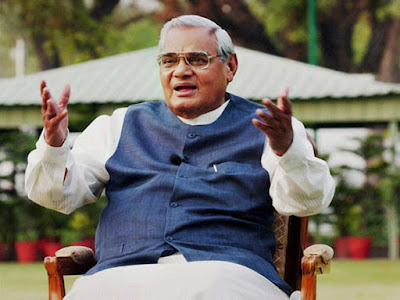THE TRUE VIKAS PURUSH OF INDIA - ATAL BIHARI VAJPAYEE [B.30]
"A true leader sees his work as selfless service towards a higher purpose".
We Indians have been very fortunate to witness the rule of such a leader who was a true visionary for India in every aspect. Atal Bihari Vajpayee, who was the prime minister of India for three terms, was a writer and poet too. His oratorical skills and the way of keeping his stance was so excellent that being impressed with them, once Nehru predicted that he would become the prime minister of India. Let us dive deep and find out why Vajpayee Ji was called a man with many competitors and no enemies.
Let's get started,
Vajpayee Ji's sole purpose was the betterment of the nation always. Let us look at some of his major contributions at a glance which will grow immense respect for him in your heart.
- He introduced India to new heights in terms of economic growth. Despite many catastrophic events like the Kargil attack, drought, cyclones, parliament attack etc. occurring during his tenure, he brought new economic and social reforms and also focused on uplifting the unprivileged sections of the society. The GDP of India saw a hike of 8% and the inflation rate was very low.
- A reform was made in education policy where education was made free for the children of 6-14 years because he knew the importance of education to build a strong country and as a result of this reform, the number of dropouts from schools saw a big decrease of 60%.
- He knew the importance of connecting villages with cities for India to develop. He launched a golden quadrilateral project that made transportation easy by connecting metropolitan cities - Chennai, Kolkata, Delhi and Mumbai - through highways.
- During his tenure, India maintained good relations globally. He gave a green signal to road connectivity between India and Pakistan and made an effort to reduce terrorism. Vajpayee Ji passed the Chandrayan 1 project and made India step its foot ahead in science and research.
Vajpayee Ji was one of those very few politicians who worked only for national benefits and not for fulfilling personal motives. He believed that "the government will come and go and new parties will be formed but the nation and its democracy should stay forever". His ideologies are a great motivation for today's politicians and all of us. The main priority was always the progress of the country over politics and that is why being in opposition, he stood for the country because according to him, the purpose is bigger than the position. He was one of those politicians who maintained good relations with the opposition party's people. He kept his stance against the opposition and fought for the party in the parliament but outside the parliament, his good equations with them made them believe that the fight is only against the policies of the opposition and not the people. His charismatic oratory skills impressed not only the opposition parties but he was loved and respected across the world. Anybody who talks about Vajpayee Ji will always fall out of words to describe what an enormous personality he was and we can never thank him enough for the gift of selfless work towards the country. I conclude the blog in his own words-
Mere Prabhu!
mujhe itni oonchai Kabhi mat Dena,
Gairon ko gale na laga sakoon,
itni rookhai Kabhi mat Dena |
If you like this blog then do like it, share and subscribe and keep in touch for upcoming blogs. You can visit the archives page to watch the videos and photo gallery. TSCB ARCHIVES.
JAI HIND!









Superb 👌
ReplyDeleteThank you !
Delete👌🏻👍🏻
ReplyDelete😁😁
DeleteKeep up the great work 👍👍
ReplyDeleteThank you !
DeleteToo good yrr
ReplyDeleteThank you so much !
Delete